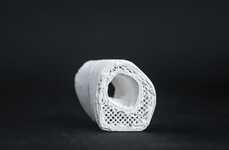
This National University of Singapore Innovation Personalizes Medication
Laura McQuarrie — June 4, 2016 — Tech
References: techtimes
Scientists at the National University of Singapore have developed a 3D-printed system for creating hyper-personalized medical pills.
There are currently pill designs and technologies that can improve upon the effectiveness of the delivery of medication, such as through low-dosage or slow-releasing capsules. NUS scientists have improved on this with a 3D fabrication method that revolutionizes the way tablets are taken.
The 3D-printed pills are made with a polymer that is designed to create unique shapes for the pills, which plays a part in the release rate of the drug. In order to give doctors more control over the kinds of medication they are able to offer, NUS scientists created a software that lets doctors draw a tailor-made design for tablet capsules, which can then be put through a 3D printer.
There are currently pill designs and technologies that can improve upon the effectiveness of the delivery of medication, such as through low-dosage or slow-releasing capsules. NUS scientists have improved on this with a 3D fabrication method that revolutionizes the way tablets are taken.
The 3D-printed pills are made with a polymer that is designed to create unique shapes for the pills, which plays a part in the release rate of the drug. In order to give doctors more control over the kinds of medication they are able to offer, NUS scientists created a software that lets doctors draw a tailor-made design for tablet capsules, which can then be put through a 3D printer.
Trend Themes
1. Hyper-personalized Medication - The development of 3D-printed pills personalized for individual needs opens up new opportunities for hyper-customized medication solutions.
2. Revolutionized Drug Delivery - The 3D fabrication method used creates unique shapes for pills, unlocking new avenues for improving the effectiveness of drugs and the ways they are taken.
3. Customized Pill Designs - The software allowing doctors to draw tailor-made designs for tablet capsules enables the creation of pills beyond the limits of traditional methods, opening up opportunities for new medications.
Industry Implications
1. Pharmaceuticals - The 3D-printed pills could disrupt the pharmaceutical industry by enabling more precise drug delivery and personalized medication solutions.
2. Biotech - The creation of hyper-personalized medication solutions could lead to an explosion of innovations in biotech and biopharmaceuticals.
3. 3D Printing - The use of 3D printing to create hyper-personalized medication opens up a new field of applications for the technology.
4
Score
Popularity
Activity
Freshness























